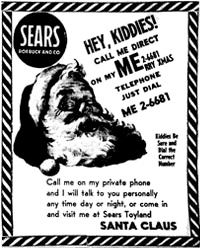
A quick programming note: I’m taking tomorrow off because it’s Christmas, even though I don’t celebrate it. Merry Christmas to those who do! (And a happy Hannukah to those who celebrate that, starting tonight, too! If I remember, I’ll share my personal Hannukah story on Friday.) As for today, here’s one of my favorite Christmas facts/stories, originally shared in 2013. — Dan
Why The American Military Pretends to Track Santa Claus
Every Christmas Eve, children around the world wait for a visitor to arrive through the chimney via reindeer-led sleigh, or whatever other means of entry and travel local custom dictates. Santa exists in the hearts and minds of these children, and for literally hundreds of millions of these children, Santa's actual location is of utmost concern. They write him letters at his North Pole address starting in November or December. Since Christmas Eve, 1955, children call up the United States military to ask for his current location because -- and you may know this already -- the North American Aerospace Defense Command ("NORAD"), headquartered in Colorado, tracks St. Nick's every move that night. They even make faux videos of Santa delivering gifts on his tour around the globe.
That seems like a strange use of multi-billion dollar defense technology. And it is, even though the "tracking" is only slightly more real than Santa himself. How does such a thing happen? Easily: just start with a typo, and add a military officer with a good sense for making kids smile.

On Christmas Eve Day, 1955, Sears ran the ad pictured above in a newspaper in Colorado Springs, Colorado. The advertisement invited children to call Santa, "direct," on his "private phone," "any time, day or night." Many children took up the invitation, the first one being a young girl. But the man on the other end of the phone wasn't red. The phone, however, was. The phone number in the advertisement was incorrect, and instead of calling the Sears Santa Hotline, as mental_floss reports, the child had called a phone at NORAD (then "CONAD"). And not just any phone. The number led to a red emergency phone that was typically reserved for incoming messages from the Pentagon or other higher-ups in the military.
The colonel in charge, Harry Shoup -- once he figured out that it was a wrong number, and not a prank -- played along. He told the young caller that he was, indeed, Santa (sometimes it's OK when members of the military lie to citizens) and asked her if she had been good. The two spoke a bit further -- about cookies and reindeer, of course -- and then Santa Shoup and the girl both hung up. And then the call rang, again. It was, still, not the Pentagon.
Shoup took the initiative and assigned others to man the phone, speaking to the callers as if they were Santa. The goodwill gesture resonated throughout NORAD's halls and has become an annual tradition ever since. Every year, hundreds of volunteers man the phones (and now, email), answering when children call. According to the Huffington Post, volunteers are given an "11-page playbook [which] includes a list of nearly 20 questions and answers, including how old is Santa (at least 16 centuries) and has Santa ever crashed into anything (no)."
On the other hand, he's almost certainly breaking the sound barrier, but likely not the speed of light.
Support Now I Know — Visit Today’s Sponsor!
Travel Pros Know Foreign Currency Is a Must in Their Wallet
You've booked your international flight and favorited the must-eat restaurants. You can almost taste the food now. So, what's next on your travel checklist?
Many U.S. travelers only realize the importance of carrying foreign currency once it's too late. Bringing foreign cash, and knowing how much to bring, is as important as making sure your credit card providers know you are traveling internationally.
Travel pros bring currency so they can:
pay like a local, never missing a deal or experience,
securely travel with an important backup payment method,
and have cash in hand for the most common payment type for small transactions.
Museums, cafes, street vendors, vintage shops, taxis, and attractions can be cash only or you may need a backup payment in emergencies. Don't miss out or look foolish when it comes time to pay or tip. Pro travel hack: don't forget merchants are more willing to haggle with cash.
Who doesn’t like to brag about the deal they got?
International travel is full of anticipation and new experiences. Ease your payment worries by ensuring you have a secure backup payment and are ready to buy how you want, when you want.
Order now to get currency delivered straight to your door and you'll be traveling like a pro with cash in hand.
More About Santa
Today’s Bonus fact: Want to write a letter to Santa? You can -- and you'll likely get a reply. After receiving a lot of letters for the jolly man in the red suit in 1974, members of Canada Post's Montreal office decided to write back, hoping to keep children from being disappointed. In 1983, Canada Post took the program national, establishing a program to reply to all letters addressed to Santa. To streamline the process -- which, given the million-letter volume, is probably necessary -- Canada Post set up a special mailing address. You can write to St. Nick at "Santa Claus, the North Pole, Canada," with postal code H0H 0H0. And if you're sending from within Canada? No postage is necessary.
From the Archives: He Knows When You Are Sleeping: Krampus, not Santa.
Related: "The Night Santa Got Lost: How NORAD Saved Christmas" by Michael Keane. 4.9 stars on 45 reviews, which is pretty exceptional.
Support Now I Know!
Now I Know is supported by readers like you. Yes, you! Many of my readers donate a few dollars a month to help Now I Know grow and thrive. And in exchange, they get an ad-free version!
Interested in supporting Now I Know? Click here!
And thanks! — Dan

